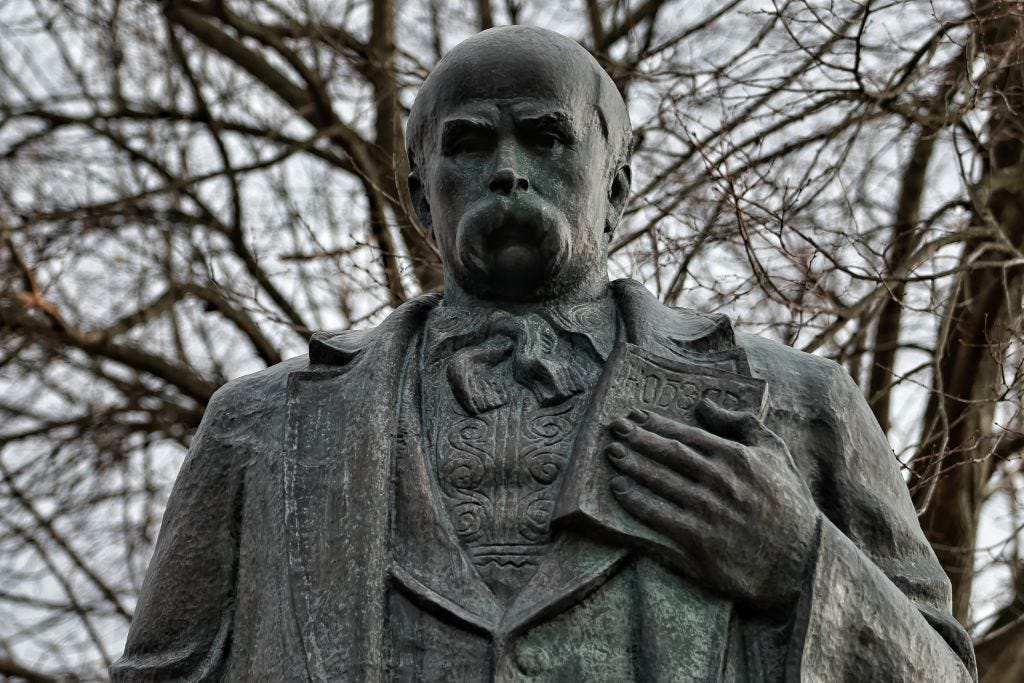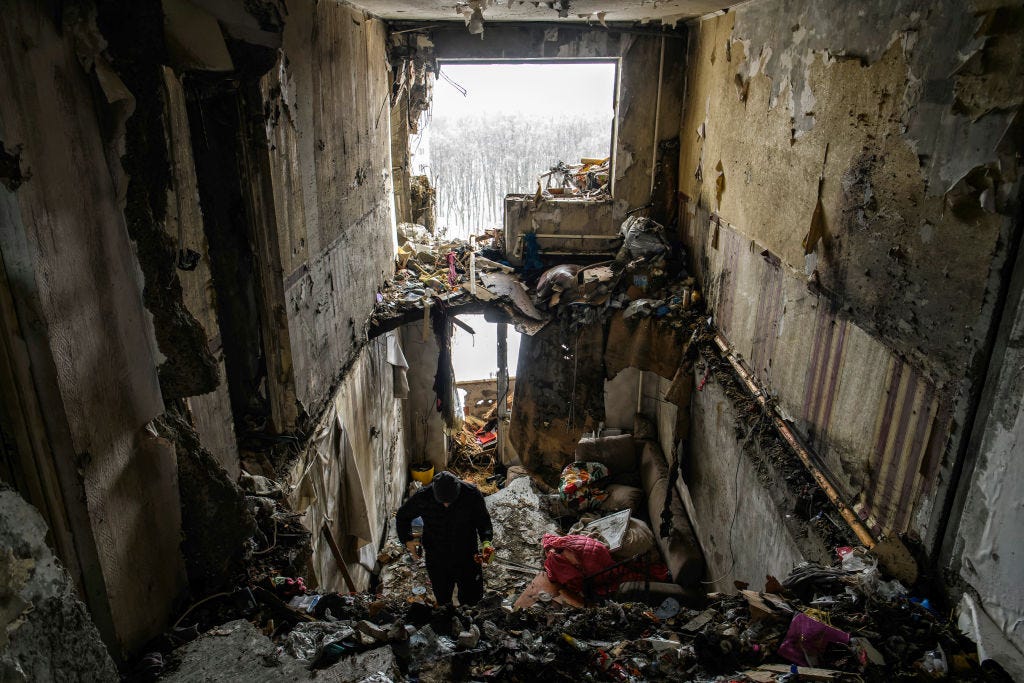We could all use a laugh
The dark art of comedy in wartime Ukraine: what was funny and isn’t anymore? Once serious but now hilarious? In reporter’s notebook: Oksana mulls over a statue for an executed Ukrainian soldier.
Editor’s note: Over the past month we’ve seen a decline in paid readers. If you value our human-first reporting on the war, please take this moment to upgrade to a paid subscription. We need your help to make sure this conflict isn’t forgotten.
Last fall, when I visited the Comedy Room, Kyiv’s first venue devoted exclusively to stand-up, the mood was somber. The first act – Ivan Barbul, who founded the club – tried to warm up the crowd with a little dark humor.
"We all have a common dream: for Vladimir Putin to either die or be judged,” Barbul mused. “I don’t want him dead. I want him in court, so everyone can see him. But I’m really surprised by the location.”
The Hague, in the Netherlands, wasn’t where Barbul thought Putin should get justice. He’d prefer the trial to take place in the southwestern-Ukrainian region of Zakarpattia: “So this asshole can wait in line a bit, like everyone does, and have to spend some time near some old stinky granny who’s in court because of her cow, so he will be all tired, and they will postpone the case,” he began.
Then, alluding to an infamous case in Zakarpattia earlier that year, in which a teenage girl was raped and the assailants were given nothing more than probation, Barboul said he hoped for Putin to “get raped in some toilet by students, and for the judge to find them not guilty, because it’s a court in Zakarpattia.” The crowd rewarded him with laughter.
Performing in darkness, metaphorical and literal, has become the lot of Ukrainian comics in wartime. Power is intermittent even in cities. Comedians travel to the front lines to perform for soldiers and do stand-up in underground bomb shelters to soothe frightened civilians. Once, a comedy cellar actually became a makeshift bomb shelter when an air-raid siren sounded an hour before the start of a show, Dmytro Serkov, a comedian in Kyiv, told me.
The venue filled to capacity, with people who were just there for their safety joining the ticket-holders.

Probably the most famous historical figure in Ukraine is 19th century poet and artist Taras Shevchenko.
Considered a founding force behind Ukrainian national identity and a fierce critic of Russian colonialism, Shevchenko had a long history of poking the Russian Bear. Shevchenko’s cheeky warning in the poem ‘Kateryna’ makes me grin because of the discordance of the opening two lines:
“O lovely maidens, fall in love / But not with Muscovites.”
But it was his description of the Tsar’s wife as a “dried-up mushroom” in his poem ‘The Dream,’ a comedic tale that skewers Russian imperialism and the oppression of Ukraine, that got him imprisoned in 1847.
It’s in this long tradition of anti-Russian humor, needling tsars both past and present, that the modern Ukrainian comedian continues.
Before the war, many comedians performed their sets in Russian and eyed major comedy festivals in Russia as the pinnacle of career achievement. Now nearly all perform in Ukrainian – including Oleksandr Kachura, who grew up in Kharkiv, a Russian-speaking city in northeastern Ukraine.
“Some people cannot give up smoking. I cannot give up Russian,” Kachura told me. He still mixes Russian into conversations with his wife and childhood friends, but he has quit the habit professionally. The audience won’t laugh at jokes delivered in Russian, comedians say.
Unless, of course, the Russian language is the butt of the joke.
“Nowadays, if we want to show some stupid person, an ignorant person, we always say this person’s sentences in Russian,” Barbul told me.

In the old days, you could amuse a crowd with jokes about sex, workplace shenanigans, and political corruption. Now the jokes are about air-raid sirens, missile attacks – and dead Russians.
Here’s one by Serkov, about the notoriously slippery winter Kyiv streets:
"When I would be younger, say age 12, and I tripped, I would fall and get back up, and continue walking without any problems. Now I'm 31, so when I trip, I text my mother and all my relatives, saying ‘goodbye, I'm dying!’
Recently, I tripped, and then a second guy tripped next to me. I asked him, 'what happened? Why did you trip as well?' He said, 'oh, I thought it was incoming!'"
Perhaps too many jokes are about the war, comics told me. Early in the fighting, some stand-up comics would simply proclaim how much they wanted to kill Russians, to raucous applause.
“I believe there was some damage to the sense of humor of Ukrainians during the invasion, and probably we haven’t healed from it,” another comedian, Bohdan Boyarin, told me. Of his audience, he said, “They will probably be laughing at the kill-Russian jokes for 20, 30 years.”
Earlier this year, a shark attacked and killed a Russian tourist in Egypt, which led to jeering from some on Ukrainian social media. One photoshopped a photo of the chief of the Ukrainian military intelligence, Kyrylo Budanov, to include a picture of a shark, like this:
“I think the reality we live in has become darker and the humor has become darker as well,” another Ukrainian comedian, Oleksandr Kachura, told me.
One comic told me that dead-Russian jokes are a “cheat code” for cheap laughs. And they are morally troublesome as well. “I’m actually sure that this hatred that we have developed since the beginning of the invasion toward Russians will play a bad joke on us in the future,” Boyarin said. “Because this hatred that you accumulate for so long doesn’t just go away that easily.”
At Barbul’s club, the bar sold shots of a cherry-flavored liquor and pledged the proceeds to the troops.
Jokes have the power to strip away the fear of something, and the control that that fear has over you. You defang a wolf when you laugh at it – it’s why Tsar Nicholas I imprisoned Taras Shevchenko. The crowd, Barbul told me, was there for a palliative.
“Comedy works as an anesthetic for the soul,” he said. “People laugh about things that scare them. And then they stop being afraid of it, because they remember the joke about their fear.”
Comedy is also, at its core, about relatability –about the audience’s rueful familiarity with the story the comedian tells. And so the jokes that stir Ukraine have begun to reveal fissures in the experiences of its people, particularly between what’s funny to civilian audiences in the country’s west, and what amuses military audiences farther east.
“What is the nature of stand-up?” Serkov, who has traveled to the front many times to entertain the troops, asked me. “You live your life, you go through some experience, and then you speak about it.”
Many soldiers near the front lines have a taste for harsh jokes reflecting the trauma and camaraderie of the trenches.
“They can listen to your jokes, like about your wife or girlfriend or something, but it’s really far away from where they are now … They’re in this different, separate life,” Serkov said.
Serkov told me that soldiers shared anecdotes with him that they thought were particularly funny. But not all of them would likely resound the same way for civilians.
In one, a bunch of soldiers were given some goat meat and decided to barbecue it near the front lines. Smoke from their fire gave away their position, and nearby Russians started to pummel them with mortars. The Ukrainians retreated from the area for safer cover. But they didn’t want to waste the precious meat, so they played rock, paper, scissors to see who would continue rotating the meat while under bombardment.
Another anecdote Serkov heard was from a soldier with a medical battalion. During a medical evacuation mission, this soldier was searching for a wounded comrade. Hearing his name shouted, the wounded man picked up his detached leg and started to wave with it, shouting that they should collect him now – otherwise he would start slashing Russians with his leg, as if it were a sword.
“You had to be there,” Serkov admitted. “If you haven’t been in the trenches,” he said, you couldn’t really laugh.
Behind the paywall: Our News of the Day section focuses on Ukraine’s primary challenge right now: the lack of troops. Meanwhile, in the reporter's notebook, Oksana asks herself tough questions about sacrifice and belonging while visiting the statue of Oleksandr Matsievsky in Kyiv. Matsievsky defiantly shouted “Glory to Ukraine!” before being executed by Russian troops.
Here’s what one reader had to say about why a Counteroffensive subscription is so important:
"You touch the lives of people worldwide. You seek to understand. You empathize. You confess. You rejoice. You show by example that we all belong and have a right to exist as we are or as we want to be."
Keep reading with a 7-day free trial
Subscribe to The Counteroffensive with Tim Mak to keep reading this post and get 7 days of free access to the full post archives.






